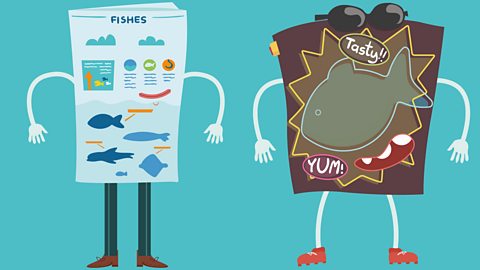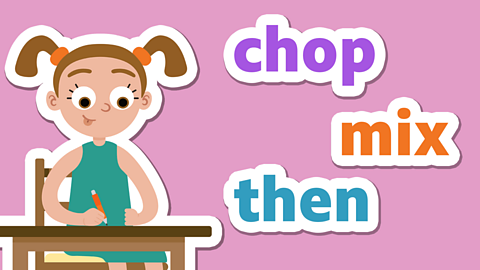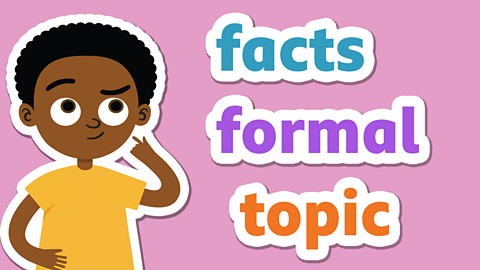Watch: Comparing adverts and brochures

What's the difference between adverts, leaflets and brochures?
Adverts encourage you to buy things. They use memorable words and short descriptions. They can be seen on TV, heard on the radio and printed on posters or within different texts.
Brochures and leaflets use longer descriptions and include detailed information about products and services you can buy.

Narrator: Adverts usually sell things.
Advert: Fancy buying a fish? Go on! Big yummy fish makes a tasty old dish.
Narrator: Adverts use memorable words so they can hook you into buying the thing they are advertising.
Advert: Look at this fish! Cheap fish, what a dish.
Narrator: Brochures, on the other hand are usually more informative,
Advert: Hey! Watch it, buddy.
Narrator: And contain more accurate information about products and services that you can buy.
Brochure: Good evening. A fish is a type of animal that lives in the sea. If you would like to buy one to eat then you can see the different types of fish that exist within my pages.
Narrator: Adverts are usually shorter and more to the point, while brochures are longer and with more detailed information.
But both use eye-catching words and images in order to persuade you to buy their products.
Key features of adverts
The key features of an advert
Have a look at these features to think about when writing an advert:
Name - share the name of the item you are advertising.
Statement - what is your product and what does it do?
Persuasive language - use positive language that will appeal to the customer. For example, healthy, life changing, exclusive, look no further, one of a kind.
Catchy slogan - a phrase that represents the product and makes people remember it - using alliteration, humour or rhyming can help. For example, because you’re the best.
Hyperbole - exaggerate all the positive points about the product. For example, the world’s greatest!
Rhetorical questions - ask the viewer questions that may not have obvious answers to make them think they need the product. For example, have you ever needed…
Customer review - have a customer give a positive review on the product. For example, It’s the best I’ve ever tasted! (Jack, 15, from Lincoln).
Special offer - try to entice the customer even more with a special offer. For example, buy one, get one free.
Reference point - show someone that customers will respect supporting your product. For example, a famous footballer using a certain brand of boots.
Watch: Leaflets
A step-by-step guide to creating a leaflet
Registers
Register: It’s all about how you say it!
Register is how you use language differently in different situations. It changes the way people understand what you say or write. Choice of register is also important when creating an advert or a brochure.
There are lots of types of register, including formal or informal.
For example: choosing the right tone for a situation.
Formal - My dear Sir, could you make the ride a little faster please?
Informal - Faster please, mate!
Impolite - You there, little man. Faster now! Get on with it!
Register can also change the vocabulary and/or the style of your speech/writing.
For example, a doctor might say:
Professional - Hello Madam, you’ve been in the wars, haven’t you? Don’t worry you’re in good hands now.
Unprofessional - Alright! You look like a right mess! The quacks at the hospital need a look at you!
Now, watch this video to understand what register is and how it can impact the way something is said or written.
Watch: What are registers?
Find out more about register
Activity 1
Activity 2
Activity 3
Watch the parody advert below. A parody is exaggerated on purpose for comic effect - so that it is funny!
Have a look at the key features of an advert above and make a list of which ones you notice as you watch the video.
Parody of a darts workout.
Activity 4
Writing a parody advert:
Just like the video, your task is very much about turning the world on its head and making something normal or everyday seem ridiculous.
Part 1
Think of an activity you can do that doesn’t take too much physical effort, for example, sleeping, reading, taking a bath, having a cup of tea.
Try to write down even the tiniest things you must do when doing your chosen activity (even if they seem inactive) for example, find a bed, put on bed sheets, fluff pillows, turn out lights, lay down and count sheep…
Part 2
Watch the darts advert again. Are there any ideas or features you can borrow, change and use from the example for your own advert?
Part 3
Dave Delaney managed to get an entire exercise workout from playing darts. Write your own advert for an exercise DVD that uses the activity you thought of earlier.
Try to include as many of the key features of an advert as you can.
Example:
If you get a bit stuck when writing your advert script, have a look at this based on the video.
Top tips!
- Choose the correct register for your advert. Is it formal? Informal? Professional? Funny?
- Remember! Adverts are usually quite short. Choose each word you use carefully and make sure everything you say has purpose. Dave Delaney’s example is a bit longer than usual but will give you lots of ideas!
Play our fun English game Crystal Explorers. gamePlay our fun English game Crystal Explorers
Use grammar, punctuation and spelling skills to explore jungles, caves and tombs on your mission!

More on Non-fiction
Find out more by working through a topic
- count5 of 18

- count6 of 18

- count7 of 18

- count8 of 18
